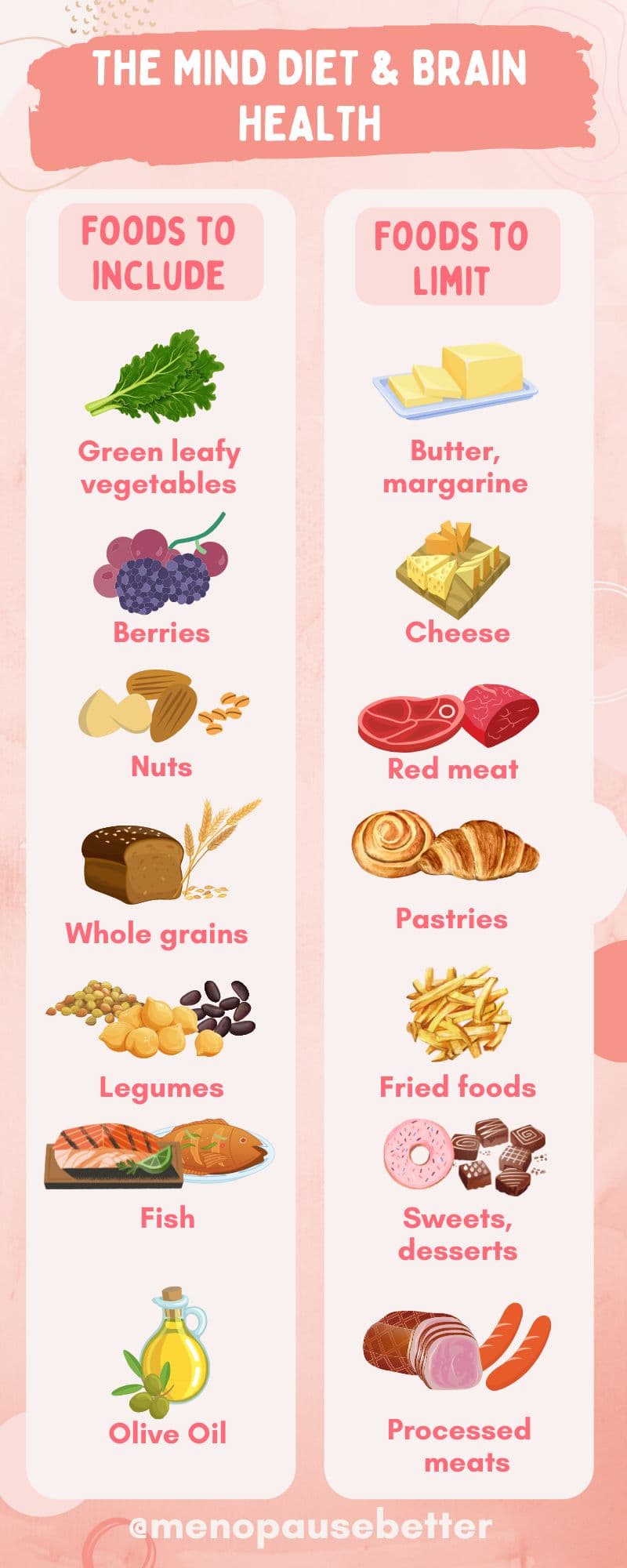How to Beat Menopause Brain Fog [The Nutrition Solution]
Are you feeling forgetful and foggy lately? Are you having difficulty concentrating?
Table of Contents
ToggleMenopause brain fog is real – and it’s no joke. As if hot flashes, sleep problems, weight gain, and night sweats were not enough, menopause is also characterized by another troubling issue: a change in brain health.
Brain fog during menopause is a common experience for many women. It can be described as a state of forgetfulness, confusion and feeling generally “out of it”.
This article will discuss what the menopausal brain is and what you can do about it.
What Causes Menopause Brain Fog?
As women transition to menopause, the changes to their hormones impact all organs, including the brain. You might find it surprising, but many of the most common symptoms of menopause are neurological, including hot flashes, disturbed sleep, mood changes, and forgetfulness.
Harvard researchers have discovered that estradiol, the primary form of estrogen, is directly related to changes in brain health.
Specifically, estradiol relates to changes in memory performance and a reorganization of our brain circuitry that regulates memory function.
What Else Can Affect Brain Function?
While there isn’t much you can do about going through menopause or aging, you do have control over many other factors that cause brain fog.
Other factors that can negatively affect brain function include:
- Nutrition deficiencies
- High-sugar diets
- Diets high in saturated fats
- Inadequate sleep
- Stress
- Sedentary lifestyles
- Excessive alcohol consumption
- Depression
- Substance addiction
- Obesity
- Underlying medical conditions like stroke, infections, traumatic brain injuries, seizures
It’s all pretty worrying, right?
The Nutrition Solution to Beat Menopause Brain Fog
Remember, you have a lot of control over the health of your brain. There are many lifestyle and diet changes you can make to keep your brain sharp and healthy.
The MIND Diet
The Mediterranean-DASH Intervention for Neurodegenerative Delay (MIND) diet and brain health have been studied together for years with excellent results.
The MIND diet combines the traditional Mediterranean diet and the DASH diet that can help you learn, focus, and make decisions. In other words, it protects your brain against cognitive decline.
MIND Diet Principles

10 Foods to Include
- Most days, eat green leafy vegetables, such as kale, arugula, spinach, and collard greens.
- Include fresh vegetables every day (two servings or more). If fresh vegetables are not available, frozen vegetables are a good alternative.
- Eat berries at least two times per week.
- Snack on nuts or add nuts or seeds to your meals at least five days a week.
- Enjoy olive oil daily.
- Eat at least three servings of whole grains per day.
- Eat fish every week. Choose fatty fish such as salmon, mackerel, herring, and sardines.
- Include lean proteins such as poultry at least twice per week.
- Include legumes like beans, garbanzos, and lentils at least three times a week.
- Drink wine in moderation (no more than one glass a day).
5 Foods to Limit or Avoid
- Butter and margarine. Use healthier fats such as olive oil or ghee more often and limit or avoid butter and margarine.
- Cheese. Limit to one slice a week.
- Fried foods. Try using an air fryer as a way to enjoy your favorite fried foods without the added unhealthy fat.
- Sweets and pastries. Limit eating these foods to a few times a week. If you have a sweet tooth, choose healthier versions of your favorite sweet treats or eat them less often and in small quantities.
- Red meat. Limit to one time a week.
Correct Nutrition Deficiencies
Certain nutritional deficiencies can worsen brain fog symptoms. Many nutrients contribute to proper brain function, but the following are some of the most common nutrient deficiencies in the United States.
Vitamin D

This vitamin is required for optimal brain function. It supports healthy nerve tissue and has neuroprotective effects in the regions of the brain concerned with learning and memory.
Additionally, vitamin D has been linked to an increased risk of depression symptoms related to brain fog.
People at risk of vitamin D deficiency include those who don’t get enough sun exposure, have dark skin, are obese, or have a medical condition that affects vitamin D absorption.
It’s easy to find out if you’re lacking in vitamin D, though, by having a routine laboratory test that’s usually performed by your doctor during checkups.
Vitamin B12
Being deficient in Vitamin B12 has been linked with poor memory and impaired ability to learn, focus, and solve problems.
For people who have this deficiency, correcting it can help with brain health. However, there is conclusive evidence that supplementation of B12 is also beneficial for healthy people.
People at risk of vitamin B12 deficiency include vegans, people with gastrointestinal disorders, and older adults.
If you suspect you might be deficient in either of these nutrients, talk to your doctor about getting a blood test. Correcting any deficiencies can help improve your cognitive function as well as your overall health.
Limit Alcohol
Drinking alcohol can have some benefits but can also affect brain health if it’s consumed in excess.
In the short term, alcohol can impact the areas of the brain that are responsible for speech, memory, and judgment.
In the long term, alcohol can cause changes in neurotransmitter activities and even changes in the areas of the brain responsible for short- and long-term memory.
Other Natural Solutions
Exercise
According to Harvard researchers, exercise can boost your thinking skills and memory both directly and indirectly.
Regular physical activity can directly reduce insulin resistance and inflammation, promote growth factors that support new blood vessels in the brain, and improve the health of brain cells overall.

Exercise also has other benefits for brain health, such as reducing stress and improving sleep quality. All of these factors can help reduce the effects of the menopausal brain.
Any amount of exercise helps, but for the best results, aim for at least 150 minutes of moderate-intensity aerobic exercise per week.
Sleep
Getting enough sleep is essential for overall health and well-being, and it’s especially important for brain health.
Sleep helps the brain to consolidate memories and form new connections between ideas. It also clears out toxins that can build up during the day and contribute to brain fog.
If you are having trouble sleeping, review natural menopause insomnia remedies that work.
Enjoy Life More
Depression can physically change your brain in the areas related to memory, thinking, and planning.
That’s why enjoying life is an important aspect of brain health. Start by building meaningful relationships with others, and spend time with friends and family you love.
Also, try to commit time to activities that make you happy, whatever that may be. Maybe you enjoy painting, listening to music, taking care of your garden, or working out.
Additionally, therapy can be beneficial for most people. If you think you might be depressed, get professional help.
Stay Mentally Active
Your brain also needs a workout, just like your body.
Brain-healthy action can be enjoyable activities such as doing the crossword puzzle while you drink your coffee in the morning or reading your favorite book before bed.
If you want to take an extra step, you can even learn a new hobby or take a new course.
The Bottom Line
The aging process can indeed cause a decline in brain function. This decline can be more prominent in women as they transition through menopause because of decreased estrogen levels.
However, you stay sharp by having an overall healthy lifestyle.

Dr. Su-Nui Escobar, a Registered Dietitian/Nutritionist in Miami, FL, is dedicated to empowering women in perimenopause and menopause to live healthier, more satisfying lives.
With a doctorate in clinical nutrition from the University of North Florida, she has expertise in menopause and weight loss, including the unique challenges faced by those on weight loss medications.
Su-Nui’s passion for her field is evident in her previous role as the Academy of Nutrition and Dietetics spokesperson.


